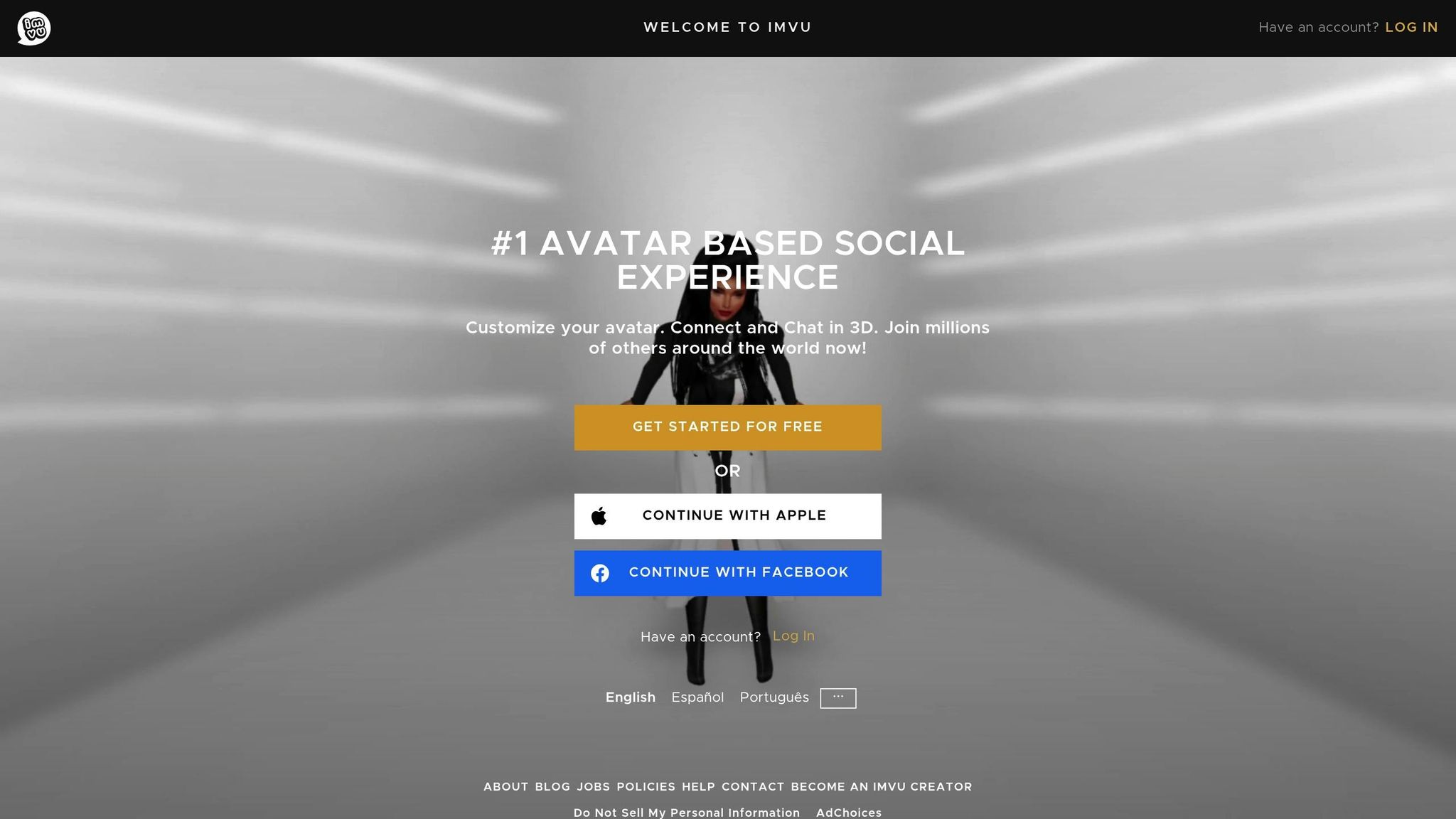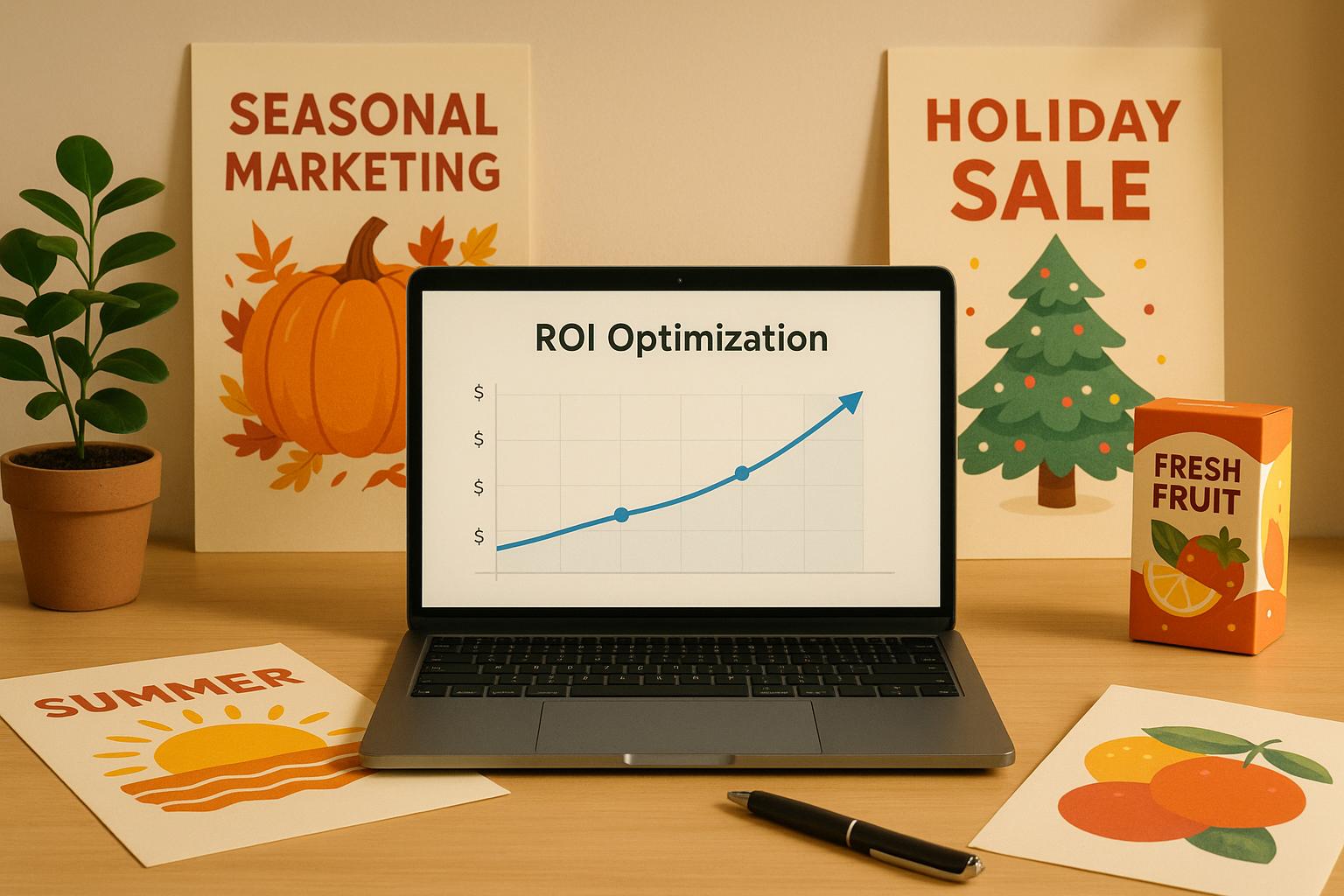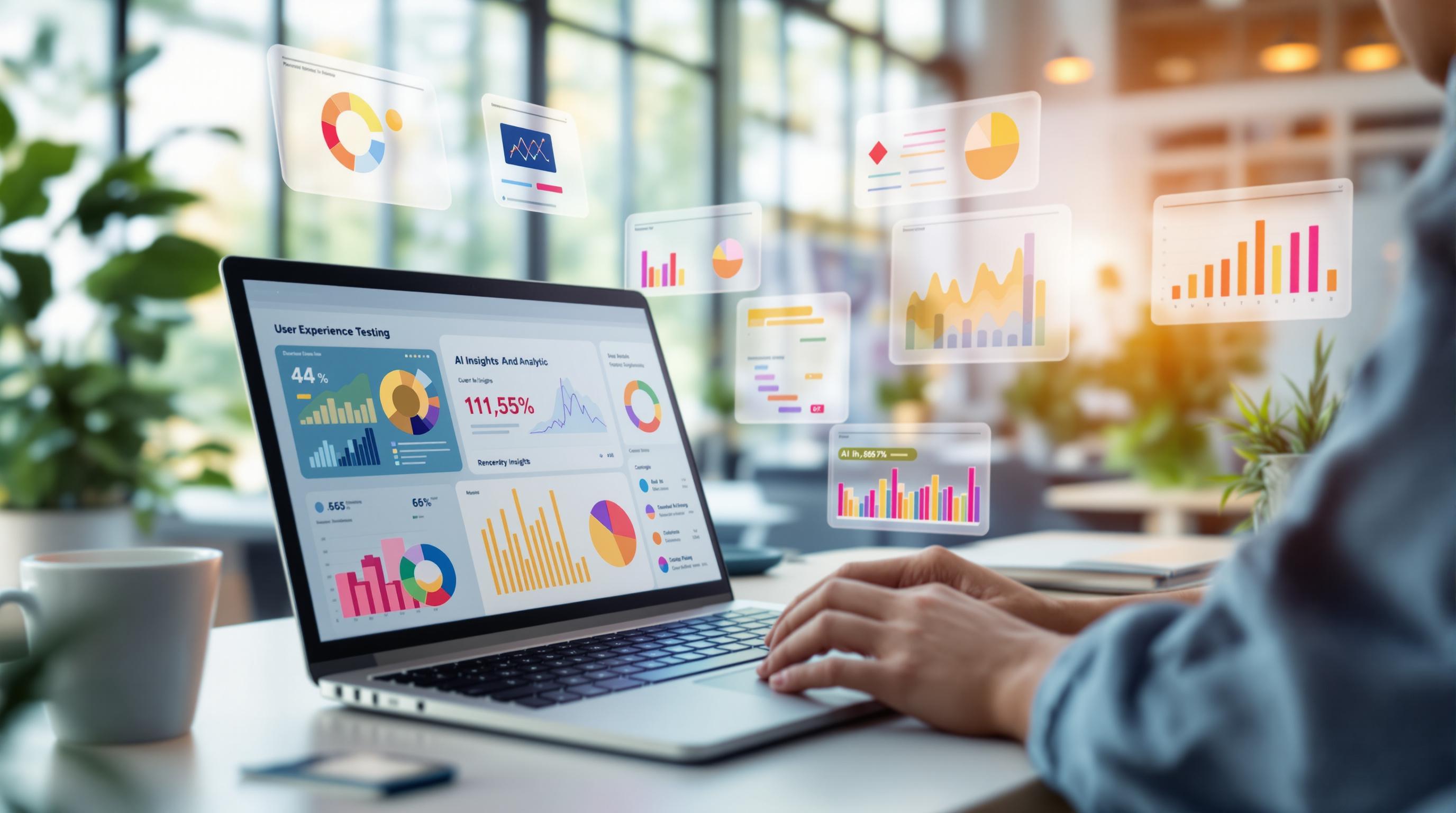AI is transforming retargeting ads into tailored experiences that boost engagement and conversions. Here's what you need to know:
- Retargeting Ads: These ads re-engage users who’ve interacted with your site, focusing on those most likely to convert. Retargeted visitors are 43% more likely to convert, with Facebook retargeting achieving 76% higher click-through rates.
- Why Personalization Works: Generic ads are out. Personalization increases click-through rates by 14%, conversions by 10%, and drives 6× higher email transaction rates. Consumers prefer brands that prioritize tailored interactions.
- AI's Role: AI enhances retargeting by analyzing user behavior, predicting actions, and delivering timely, relevant ads. Methods include:
- Predictive Analytics: Anticipates customer needs, boosting conversions by up to 40%.
- Dynamic Micro-Segmentation: Creates precise audience groups, increasing customer lifetime value.
- Real-Time Optimization: Adjusts campaigns instantly for better results.
- Top Tools: Platforms like Customers.ai, AdRoll, and Google Ads offer AI-driven features for businesses of all sizes, improving efficiency and ROI.
AI-powered retargeting delivers measurable results, including higher engagement, reduced costs, and increased revenue. However, balancing personalization with privacy is critical, especially under regulations like GDPR and CCPA. Future trends point to privacy-first strategies, explainable AI, and integration with IoT for even more targeted campaigns.
For actionable insights and tools, explore resources like the Marketing Funnels Directory.
How to supercharge retargeting ads with automated personalization w/ Lomit Patel VP of Growth, IMVU

Main AI Methods for Personalizing Retargeting Ads
AI has reshaped retargeting, taking it from simple reminders to a sophisticated form of precision marketing. These methods empower brands to go beyond basic demographics, delivering messages that genuinely connect with individual customers.
Predictive Analytics for Customer Behavior
With predictive analytics, AI can anticipate what customers might do next - sometimes even before they realize it themselves. By digging into vast amounts of historical data, AI identifies patterns in browsing habits, purchase histories, and engagement trends. This helps create detailed customer profiles and forecasts future actions, like when someone is most likely to make a purchase.
For example, an e-commerce company used AI to target customers who abandoned their carts. By showing ads featuring the exact items left behind, along with personalized discounts, they boosted conversion rates by 40% and significantly reduced cart abandonment. Another example? A B2B SaaS company used AI to predict trial sign-ups based on user engagement, increasing sign-ups by 25% while also improving the quality of leads.
Dynamic Micro-Segmentation
AI doesn’t just predict behavior - it also takes audience segmentation to a whole new level. Traditional methods group audiences based on broad traits, but dynamic micro-segmentation uses AI to create highly specific, real-time audience segments. This means AI can analyze factors like browsing behavior, purchase history, and demographics to form precise groups that evolve as customer behaviors change.
Here’s the impact in numbers: 86% of brands using AI for predictive segmentation have reported a noticeable boost in customer lifetime value. The adoption of AI in segmentation has also grown - from 55% in recent years to 72% in 2024.
"Every company has data, but if you can't action off that data instantly, then it doesn't do you any good... The magic with Blueshift is its agility and ability to handle data for segmentation, journeys, and personalization across all channels, no matter the speed or attributes that we put in."
- Joyce Poole, Sr. Director, Marketing CRM, LendingTree
Real-world examples highlight how effective this can be. An e-commerce apparel brand used AI to split cart abandoners into two segments: "Price Sensitive" and "Style Focused." The result? A 35% jump in retargeting conversion rates. Another direct-to-consumer fashion brand identified a unique group of "night owl deal hunters" - shoppers who browsed late at night and made purchases during promotions. While this group made up only 8% of their audience, they generated 22% of revenue and had a 47% higher conversion rate compared to standard promotional emails.
Real-Time Data Processing and Optimization
The third game-changing method is real-time data processing. AI continuously monitors campaign performance, adjusting ad placements, bidding strategies, and creative content on the fly to keep campaigns effective. This real-time adaptability ensures ads stay relevant as market conditions shift. Plus, it allows brands to make quick decisions that lower costs while improving personalization.
This approach transforms retargeting from a simple reminder into a proactive strategy. By anticipating customer actions and delivering the right offer at the perfect moment, AI ensures retargeting efforts are not only timely but also impactful.
Top AI-Powered Retargeting Tools
AI has reshaped retargeting, taking it far beyond simple remarketing tactics. By leveraging techniques like predictive analytics and real-time optimization, these tools analyze user behavior, predict purchase intent, and deliver personalized ads. The results? Click-through rates as much as 10 times higher. With 88% of marketers already using or planning to use AI for retargeting, picking the right platform is more important than ever. Below, we dive into some of the top AI-powered retargeting tools and what makes them stand out.
Modern AI platforms excel at tasks like behavioral analysis, dynamic ad creation, and real-time campaign adjustments. These tools can evaluate browsing patterns, demographic information, and purchase history to craft highly targeted campaigns that adapt on the fly. The impact is undeniable - retargeting campaigns can boost conversion rates by 150% and increase ad engagement by up to 400%.
Comparison of Leading Tools
The retargeting market is packed with options, each offering unique features tailored to different business needs. Here's a snapshot of how some of the top platforms compare:
| Platform | Starting Price | Key Strengths | Best For | User Rating |
|---|---|---|---|---|
| Customers.ai | $99/month | AI-driven audience segmentation, visitor tracking, multi-channel retargeting | Small to medium businesses looking for advanced automation | 4.9/5 |
| AdRoll | $36/month + ad spend | Cross-platform campaigns, dynamic ad creation, detailed analytics | Businesses seeking unified web, social, and email retargeting | 4.5/5 |
| Google Ads Remarketing | Variable (ad spend only) | Unmatched reach across Search, Display, and YouTube; seamless integration | Companies already using Google Ads | 4.6/5 |
| Criteo | Performance-based pricing | Product-specific targeting, dynamic product ads, e-commerce focus | Online retailers with large product catalogs | 4.4/5 |
| AdWisely | $19/month + ad spend | E-commerce automation, dynamic product ads, Facebook/Google integration | Small e-commerce stores needing simple automation | 4.5/5 |
While this table provides an overview, let’s take a closer look at what makes each tool shine.
Customers.ai stands out for its advanced AI segmentation capabilities and user-friendly design. It’s perfect for small to medium businesses looking to streamline their retargeting efforts.
AdRoll is a powerhouse for cross-platform campaigns. It allows businesses to manage retargeting across web, social media, and email channels all in one place. This reduces the hassle of juggling multiple platforms and simplifies campaign management.
For businesses already using Google’s ecosystem, Google Ads Remarketing is a no-brainer. Its integration with Google Analytics and vast reach across Search, Display, and YouTube makes it an excellent choice for maximizing exposure.
Criteo is tailor-made for e-commerce. Its performance-based pricing model and dynamic product ads that highlight specific items users have viewed make it a favorite among online retailers.
Smaller e-commerce stores will find AdWisely a budget-friendly option. Starting at just $19/month, it automates dynamic product ads across Facebook and Google, offering a straightforward solution for businesses with limited resources.
For enterprises with bigger budgets and technical teams, platforms like Madgicx provide advanced AI capabilities. These tools offer precise targeting and bid management across multiple ad platforms, but they require more expertise to use effectively.
The right platform depends on your budget, technical know-how, and business goals. Smaller businesses should focus on simplicity and clear pricing, while larger enterprises can explore more complex tools with advanced AI features. Testing different platforms to discover what resonates with your audience is the key to a winning retargeting strategy.
sbb-itb-a84ebc4
Measuring the Impact of AI-Personalized Retargeting
AI has reshaped retargeting ads in ways that are both measurable and impactful. Recent research shows that AI-driven retargeting campaigns deliver 20–30% higher ROI compared to traditional methods. By examining metrics such as revenue growth, operational efficiency, customer experience, and strategic outcomes, it becomes clear how AI elevates engagement and conversion rates.
"AI is no longer a futuristic concept - it's a competitive necessity in marketing." - Ashleigh McCabe, Author
Higher Engagement and Conversion Rates
AI-powered personalization has proven to significantly boost engagement and conversions. Campaigns leveraging AI see up to 3× higher engagement and can more than double conversion rates. For example, personalized landing pages can increase conversions by 202%. On average, AI-driven campaigns achieve 1.7× higher conversion rates.
Email retargeting also benefits immensely. Personalized emails result in 6× higher transaction rates and improve open rates by 41%. Real-time personalization enhances click-through rates by 200% and increases time spent on-site by 40%. Additionally, personalized product recommendations can raise average order value (AOV) by 20–50%, while websites featuring tailored content generate 40% more revenue from visitors. Customer retention sees a boost too, with AI personalization leading to 2× higher engagement rates.
Better Budget Efficiency
AI doesn't just enhance engagement; it also optimizes spending. Companies using AI-driven tools report up to an 82% reduction in cost per acquisition (CPA). AI-based campaigns can increase sales by as much as 150%, while retargeted users are 8× cheaper to reach per click compared to acquiring new customers. By identifying high-potential prospects, AI ensures marketing budgets are spent more effectively.
There are plenty of real-world examples to back this up. Amazon reduced cart abandonment by 25% in just one month using AI. HubSpot achieved a 40% increase in click rates, and a retailer saw a 150% rise in conversions thanks to precise AI-powered retargeting.
AI also improves operational efficiency. Its predictions are 47% more accurate than traditional methods, minimizing the need for manual campaign adjustments and freeing up resources for strategic planning. Machine learning algorithms continually refine targeting and messaging, raising conversion rates from 8% to 26%.
To make the most of AI, marketers need to integrate the right tools into their systems. With 46% of marketers already using AI for ad targeting and optimization, success hinges on defining clear goals and monitoring the right metrics. Key indicators include CPA, time saved on manual tasks, and the speed of campaign execution. By tracking how AI streamlines workflows and lowers acquisition costs, businesses can clearly demonstrate how AI enhances their marketing investments.
Privacy, Ethics, and Future Trends in AI Retargeting
As AI-powered retargeting continues to evolve, businesses face increasing pressure to balance personalized marketing with privacy protection. The challenge goes beyond technical implementation - it's about earning consumer trust while adhering to complex regulations and ethical principles. This delicate balance is essential for building lasting success in AI-driven campaigns.
First-Party Data and Privacy Compliance
Privacy regulations like GDPR and CCPA have set clear rules for handling user data. Under GDPR, businesses must obtain explicit consent before processing personal data, while CCPA allows users to opt out of data collection. Non-compliance can lead to hefty fines - up to €10 million or 2% of a company's annual revenue under GDPR.
"GDPR and CCPA offer clarity on how to build AI systems that are secure, transparent, and future-ready."
– Amrita Jaswal, Digital Marketing Professional at Signity Solutions
To meet these requirements, businesses must focus on data minimization - using only the data necessary for specific purposes. Techniques like anonymization, pseudonymization, and encryption are critical for safeguarding privacy. Transparency is equally important, requiring companies to inform users about how AI processes their data and, in high-risk cases, conduct Data Protection Impact Assessments (DPIAs).
Some major companies have already embraced these practices. For example, JPMorgan Chase introduced an AI assistant for its 60,000 employees, automating routine tasks while supporting compliance efforts. Similarly, IBM Watson Health integrates advanced AI tools with HIPAA-compliant cloud infrastructure to reduce data breaches and enhance audit readiness.
Regular audits and bias-detection mechanisms are also essential for maintaining fairness in AI algorithms. Additionally, businesses must empower users to access, transfer, or delete their data upon request. These measures lay the groundwork for ethical advancements in AI retargeting.
New Trends in AI Retargeting
Building on the foundation of compliance, emerging trends are reshaping AI retargeting to make it both more effective and ethically sound. Explainable AI (XAI) is gaining traction as a tool for transparency, allowing businesses to clearly explain how decisions are made and data is processed. This is particularly important under new frameworks like the EU AI Act, which emphasizes accountability.
Intelligent Process Automation (IPA) is another game-changer. By combining Robotic Process Automation with AI technologies like machine learning and natural language processing, IPA enables dynamic retargeting campaigns that require minimal manual intervention.
Personalization remains a cornerstone of AI in marketing, with companies leveraging online behavior data to craft tailored experiences. However, this trend is increasingly guided by ethical considerations, as both consumers and employees demand responsible AI use.
"In tomorrow's AI-driven world, trust will be the real differentiator, and this begins with how we treat data today."
– Signity Solutions
Privacy-enhancing technologies (PETs) such as federated learning and differential privacy are becoming indispensable for compliance. Businesses are also exploring decentralized data models and AI-driven privacy tools to better safeguard user information.
The integration of IoT and AI is opening up new possibilities for retargeting across multiple touchpoints. From smart devices to connected cars, AI can create detailed customer profiles while respecting privacy boundaries. At the same time, cybersecurity advancements are enabling AI systems to detect and respond to potential threats.
To stay ahead, companies should adopt flexible governance models and invest in tools that enhance privacy and explainability. Detailed audit trails and regional expertise can also help navigate localized legal requirements.
For more insights and resources on compliant AI retargeting strategies, check out the Marketing Funnels Directory. Their tools and courses are designed to help businesses navigate the complexities of AI-driven marketing while staying within regulatory boundaries.
Conclusion: The Future of AI in Retargeting Ads
AI is reshaping retargeting, turning it from simple reminders into powerful tools that predict and respond to customer needs. The numbers speak volumes: the global AI in marketing market is expected to grow from $12.05 billion in 2020 to $47.32 billion by 2025, with an impressive annual growth rate of 36.6%. Companies leveraging AI-powered personalization engines are already seeing results, with a 35% jump in purchase frequency and a 21% increase in average order value.
The future of AI in retargeting is all about creating deeply personalized experiences. Instead of relying on broad demographic categories, AI allows brands to tailor interactions based on individual preferences, search behavior, and real-time context. As Paul Longo, GM of AI Ads at Microsoft Advertising, puts it:
"Personalization is evolving from general experiences based on demographics to highly individual interactions based on unique search intent, preferences, and context. And generative AI-powered solutions can help brands deliver hyper-personalized experiences at scale, leading to significantly higher engagement and conversions."
AI-driven predictive analytics is already making a difference. By improving decision-making speed by 78% and forecasting accuracy by 47%, these tools are enabling smarter budget use, better campaign planning, and access to audiences that were once out of reach.
Beyond operational improvements, AI is helping brands balance personalization with privacy. Companies that excel in personalization are earning 40% more revenue. At the same time, transparency and robust privacy measures are becoming essential for maintaining consumer trust. Treating privacy as an opportunity to build stronger customer relationships, rather than just a compliance hurdle, can set brands apart.
The future belongs to brands that embrace AI thoughtfully - experimenting with new formats, maintaining their authentic voice, and ensuring privacy-first personalization. Those who strike this balance will lead the way, delivering experiences that feel personal and respectful while building lasting connections. AI is not just changing the game; it's setting a new standard for personalized marketing.
For businesses looking to dive into AI-powered retargeting, the Marketing Funnels Directory offers essential tools and resources to get started.
FAQs
How does AI protect user privacy while personalizing retargeting ads, and what steps can businesses take to meet GDPR and CCPA requirements?
AI helps ensure user privacy in retargeting ads through advanced techniques like data anonymization, encryption, and differential privacy. These methods protect sensitive user information while still allowing for personalized ad targeting.
To meet the requirements of regulations such as GDPR and CCPA, businesses need to take key steps, including:
- Gaining explicit user consent before gathering any personal data.
- Sharing clear and transparent policies about how user data will be collected and used.
- Allowing users to view, edit, or delete their personal information upon request.
By combining AI-driven privacy tools with open and honest communication, companies can not only comply with data protection laws but also build stronger trust with their audience.
What are the key advantages of using AI for retargeting ads, and how can businesses evaluate its effectiveness?
AI-driven tools for retargeting ads bring a new level of precision to marketing efforts. They help businesses connect with the right audience at the perfect moment. By processing massive datasets, these tools fine-tune ad placements and tailor content in real time. The result? More engagement, higher conversion rates, and a noticeable boost in ROI compared to older strategies.
To gauge the effectiveness of AI-powered retargeting, businesses can monitor key metrics like click-through rates (CTR), conversion rates, and return on ad spend (ROAS). Additionally, AI simplifies attribution modeling, offering clearer insights into how campaigns impact overall performance and guide customers through their journey.
How does AI improve ad personalization in retargeting campaigns?
AI is transforming retargeting campaigns by leveraging predictive analytics to anticipate customer actions. For instance, it can estimate a customer's lifetime value or flag those who might disengage soon. This empowers marketers to zero in on high-value audiences and serve them with well-timed, targeted ads.
On top of that, dynamic micro-segmentation takes personalization to the next level. By analyzing real-time customer behavior and intent, AI creates highly specific audience groups. This means ads can be tailored to resonate more deeply, driving better engagement, higher conversion rates, and improved ROI. When combined, these AI-powered strategies not only enhance ad performance but also help build stronger relationships with customers.


